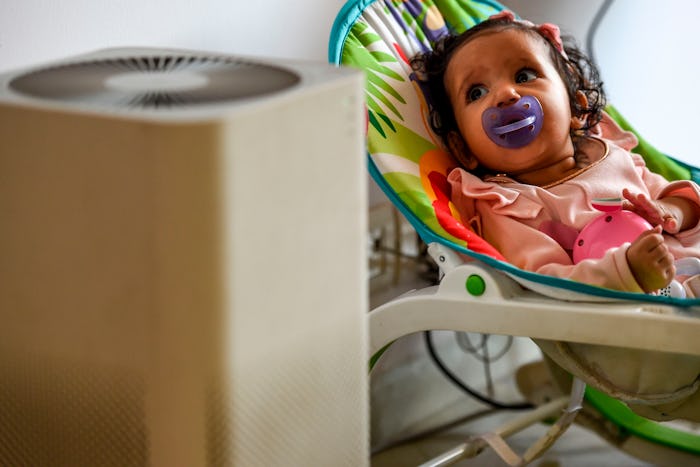Life

Some Air Purifiers Are Safe In Your Baby's Nursery, But Diffusers? Not So Much
You want to protect your newborn. You'll have visitors wash their hands before touching baby, and please no kissing! But what can you do about germs and allergens in the air? Is an air purifier in the baby nursery necessary? Doctors say there are a few things to consider before you make this purchase for baby's room.
Dr. Eugene Tsai, M.D., board-certified specialist in allergy and immunology at Providence Little Company of Mary in California, tells Romper that there’s no medical reason doctors recommend using an air purifier in your baby’s room. If you have pets, live in a pollen-heavy area, or are just worried about allergies, it’s something to take up with your little one’s pediatrician.
“There is no specific recommendation at this time for the use of portable air room cleaners to remove pet dander, dust, or pollen around infants to either prevent or treat allergic diseases,” he says. “Also, there is no definitive evidence that use of these devices alone helps patients with allergic diseases, such as allergic rhinitis or asthma."
However, according to Dr. Tsai, these devices used in combination with other allergen avoidance measures "might one day prove to be beneficial." He recommends talking to your child's physician about whether or not the use of a portable air room cleaner should be included as a part of an overall strategy of allergy avoidance.
Dr. Stan Spinner, M.D., chief medical officer and vice president at Texas Children’s Pediatrics and Texas Children’s Urgent Care, agrees with Tsai. He says that humidifiers may be the way to go instead.
“Air purifiers are not recommended for a home nursery,” he says. “Simple cool or warm mist humidifiers may be helpful in minimizing nasal mucus when a baby has nasal congestion or a mild cough, but you should clean and dry the device after daily use to prevent mold.”
So, if you want to choose an air purifier or humidifier for your baby’s room, where to begin? Think about your budget, how often you’ll need to clean the purifier, and the right size for where you want to place it.
The quality of air purifiers varies by device, as does the price. The American Academy of Allergy, Asthma, and Immunology (AAAAI) Indoor Allergen Committee recommends considering regular maintenance costs in addition to the initial cost of purchasing a purifier. The committee also notes, “Portable room air cleaners with HEPA filters, especially those that filter the breathing zone during sleep, appear to be beneficial.” Tsai adds that ozone-generating air purifiers should be avoided because of ozone’s association with increased risk of asthma symptoms.
Consumer guide AirPurifiers.com supports Tsai’s recommendation: Steer clear of ozone air purifiers and those with UV lights. The site explains that ozone is highly irritating to adults and babies, and purifiers with UV light aren’t that effective at killing germs and bacteria. And while you’re thinking about the air quality and what your baby is breathing, you may also be wondering if a diffuser in the nursery is a good idea. While many adults say essential oils help them sleep — or just make a room smell great without using aerosol sprays — they haven’t been proven safe for tiny humans.
Essential oils, like those used in diffusers, are not recommended for use on or near babies, says Spinner, because they can possibly irritate their little noses and airways.
Experts:
Eugene Tsai, M.D., board-certified specialist in allergy and immunology at Providence Little Company of Mary in California
Stan Spinner, M.D., chief medical officer and vice president at Texas Children’s Pediatrics and Texas Children’s Urgent Care